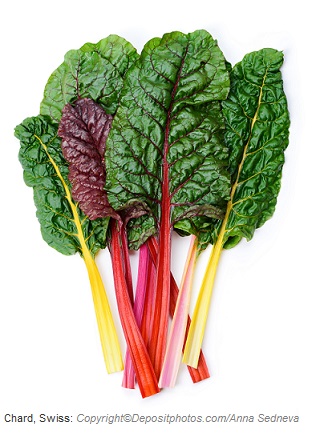Chard is a green leafy vegetable from chenopod family. It is also called “Swiss chard”. Every  100 grams of chard provides 4 grams of carbohydrates, 2 grams of fiber and 2 grams of protein.
100 grams of chard provides 4 grams of carbohydrates, 2 grams of fiber and 2 grams of protein.
Average calories: 24 per 100 grams.
|
Chard (Swiss): 100 grams |
|
|
Carbohydrate |
4 |
|
Fiber |
2 |
|
Protein |
2 |
|
Fat |
0 |
|
Calories |
24 |
Vitamins found in higher amounts: vitamins K, A, C, and E. Every 100 grams of chard contains 830 mcg of vitamin K and 6116 IU of vitamin A. Chard is poor in vitamin B groups.
Minerals found in higher amounts: magnesium, potassium, manganese, sodium, copper and iron.
Phytonutrients found in higher amounts and their health benefits: the phytochemicals in chard are carotenoids, flavonoids, and betalains. The carotenoids in chard are beta-carotenoid, lutein and zeaxanthin. They are powerful antioxidants and essential for optimal health of the eyes.
The flavonoid with a significant amount in chard is syringic acid. It is also found in acai berries and red wine and can block an enzyme called alpha-glucosidase. This enzyme breaks down complex carbohydrates into simple carbohydrates. The blockage of this enzyme helps control and stabilize blood sugar levels.
A unique phytonutrient in chard is betalains. They have antioxidant, anti-inflammatory, and liver detoxifying effects. Other food sources of betalains are rhubarb, beets, cactus prickly pear and amaranth. One of the betalains, betanin, is used as a food coloring agent to color meats, sausages, and ice cream.

